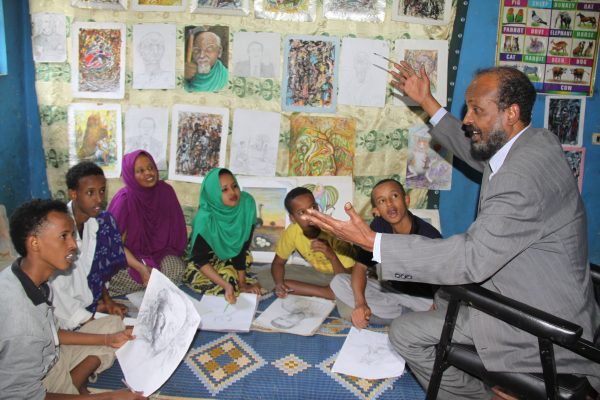
Scientific developments in the field of epigenetics have called attention to intergenerational transfers of trauma. We know now that traumatic experiences can be passed down through the genes— to children, and even grandchildren, of the survivors of horrific experiences like the Holocaust or American slavery. Sociology can help show how past trauma is passed down through social ties, and about its effects on current health and wellbeing. These social consequences of trauma could be even more powerful than the genetic impacts, affecting group dynamics, identity, history, and culture. In addition to what is passed down, sociological research also provides examples of how groups are managing these social effects, in both helpful and harmful ways.
Cultural Trauma and Group Identity
Cultural sociologists assert that in addition to individual bodily and psychiatric trauma, there is also collective “cultural trauma” when groups experience horrific events. This collective trauma compounds and complicates individual effects. In order for the process of cultural trauma to occur, the group must first recognize that a great evil has been done to them, and construct a cohesive and shared narrative that includes perpetration and victimhood. Then this narrative becomes incorporated into that group’s collective memory as an enduring aspect of their identity, like the Holocaust has been for Jews or collective memory of slavery for Black Americans.
- Jeffrey C. Alexander. 2012. Trauma: A Social Theory. Cambridge, U.K.: Polity Press.
- Jeffrey C. Alexander, Ron Eyerman, Bernhard Giesen, Neil J. Smelser, and Piotr Sztompka. 2004. Cultural Trauma and Collective Identity. Berkeley, CA: University of California Press.
Both perpetrators and victims of violence must contend with the horrific event in some way, as it is now permanently associated with their group. This can occur either through avoidance of the difficult past, or stigma management practices like acknowledgment, denial, and silencing.
- Joachim J. Savelsberg. 2020. “Writing Biography in the Face of Cultural Trauma: Nazi Descent and the Management of Spoiled Identities.” American Journal of Cultural Sociology.
Cultural Trauma and Group Conflict: Violence Begets Violence
Sometimes, this cultural trauma process results in further violence. As the group comes to understand the harms they have suffered and assign responsibility, they can seek violent retaliation against the offending perpetrators. Examples include the bombing of Pearl Harbor (and subsequent Japanese internment and Hiroshima/Nagasaki bombings), and the 9/11 attacks leading to the U.S. War on Terror. In ex-Yugoslavia, ancient collective memories were stoked and reconstructed by elites to provoke inter-ethnic violence that led to ten years of war, genocide, and ethnic cleansing. In Hawai’i, Irwin and Umemoto trace the emotional and psychological effects of violent colonial subjugation, such as distress, outrage, and depression, to contemporary violence among Pacific Islander youth.
- Katherine Irwin and Karen Umemoto. 2016. Jacked Up and Unjust: Pacific Islander Teens Confront Violent Legacies. University of California Press.
- Monika Palmberger. 2016. How Generations Remember: Conflicting Histories and Shared Memories in Post-War Bosnia and Herzegovina. Basingstroke, UK: Palgrave Macmillan.
- Sue Grand and Jill Salberg. 2017. Trans-generational Trauma and the Other: Dialogues Across History and Difference. New York: Routledge.
Memory Work: Social Solidarity and Empowerment
Sociological research also provides examples of people “making sense” of difficult pasts by doing “memory work,” which can include art, music, and other cultural production. For example, second-generation Sikhs in the U.S. are using internet spaces to challenge dominant narratives of the 1984 anti-Sikh violence in India, contributing to group solidarity, resilience, and identity within their communities here in the U.S. Similarly, the children of Vietnamese refugees are using graphic novels and hip-hop music to articulate how the Vietnam War contributes to current struggles in the Vietnamese community. This shared understanding and validation then empower communities to fight for recognition and social justice.
- Ana Ros. 2012. The Post-Dictatorship Generation in Argentina, Chile, and Uruguay: Collective Memory and Cultural Production. First edition. New York: Palgrave Macmillan.
- Long Bui. 2016. “The Refugee Repertoire: Performing and Staging the Postmemories of Violence.” MELUS: Multi-Ethnic Literature of the United States 41(3):112–32.
- Shruti Devgan. 2018. “A Haunted Generation Remembers.” Contexts 17(4):36–41.
When a group experiences a horrific event, the social effects live on to future generations. Understanding these effects is crucial for developing solutions to group suffering moving forward. Going through the cultural trauma process is necessary to overcome difficult pasts, but it is critical that this process occurs in a way that promotes justice and peace rather than further violence.

Comments